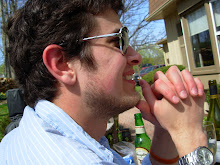
I have really wanted to read Alice's Adventures in Wonderland & Through the Looking Glass by Lewis Carroll (which is a pseudonym for famous mathematician Charles Dodgson I just learned) for quite a while now. A few weeks ago I stumbled across a used book sale at my community library and stumbled across a 50 cent copy of Alice in Wonderland, o what fate. I finished it about a week ago and I absolutely loved it. Now, Alice is no Derrida or Wittgenstein, but for a children's book, the language games are everywhere, a fun read if nothing else for odd people who love language. A few examples:
"There's glory for you!"
"I don't know what you mean by 'glory,' " Alice said. Humpty Dumpty smiled contemptuously. "Of course you don't - till I tell you. I mean 'there's a nice knock-down argument for you!' "
"But 'glory' doesn't mean a 'nice knock-down argument,' " Alice objected.
"When I use a word, " Humpty Dumpty said, in rather a scornful tone, "it means just what I choose it to mean - neither more nor less."
"The question is," said Alice, "whether you can make words mean so many different things."
"The question is," said Humpty Dumpty, "which is to be master - that's all...They've a temper, some of them - particularly verbs: they're the proudest - adjectives you can do anything with, but not verbs - however, I can manage the whole lot of them! Impenatrability! That's what I say...I meant by 'impenatrability' that we've had enough of that subject, and it would be just as well if you'd mention what you mean to do next, as I suppse you don't mean to stop here all the rest of your life."
"That's a great deal to make one word mean," Alice said in a thoughtful tone.
"When I make a word do a lot of work like that," said Humpty Dumpty, "I always pay it extra."
Or try this one:
"Aren't you sometimes frightened at being planted out here, with nobod to take care of you?" Alice asked.
"There's the tree in the middle," said the Rose. "What else is it good for?"
"But what could it do, if any danger came?" Alice asked.
"It could bark," said the Rose.
"It says 'Bough-wough!' " cried a Daisy. "That's why it's branches are called boughs!"
In the first excerpt above, I quoted so much of it because of the way everything plays out. It starts out with a very meaningful conversation about language but ends up unraveling into a mere deconstruction of language, playing with language. Which is typically what you'll find throughout the book. You won't find profound statements about language but the way the characters interact with language says something, if nothing else, the oddity of languages.
But if I could read into the two excerpts a bit, there may be something more to be had. This entire book could be a critique on a realist theory of language or correspondence theory, that words have real referents or referents in reality, a thought Derrida spent much time dismantling (in most cases rightly in my opinion). I found it to be a critique in that it presents what an absurd world we'd live in if a correspondence theory of langauge really obtained. The book then is, in a sense, hyper-literal, almost satirically so. At many places in the book, the characters in 'Wonderland' assume that the signifier has intrinsic connection (by way of form - spelling, sound, etymology) to the thing signified, which ends up with Alice scratching her head at such absurdities. The thing that makes it so funny is that you follow right along, you understand the logic, faulty as it is: they aren't just arbitrary incoherent strands of words. So whether you want to have a good book to read to your kid, love to play with language, or want to blow past any notion of authorial intent (maybe?) and have yourself a full blown satire of language, Alice in Wonderland is the book for you!











